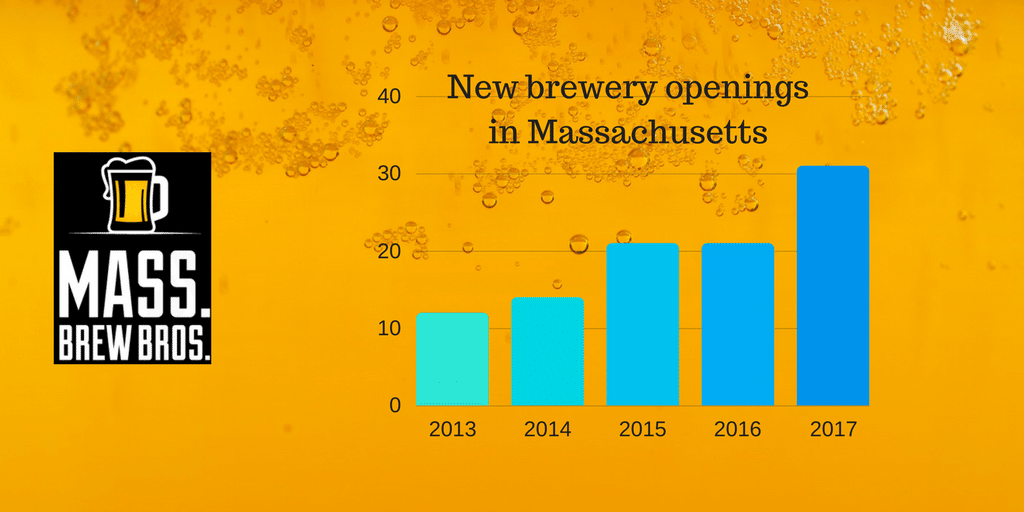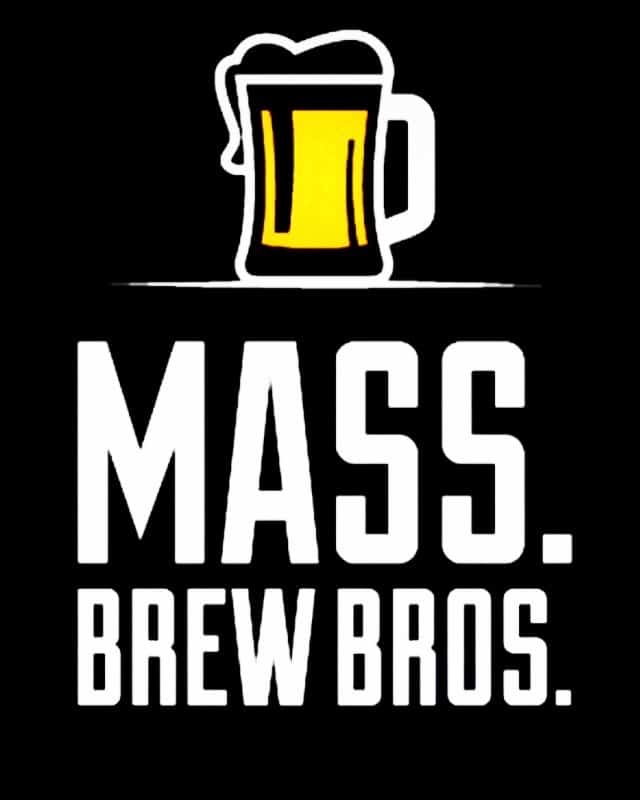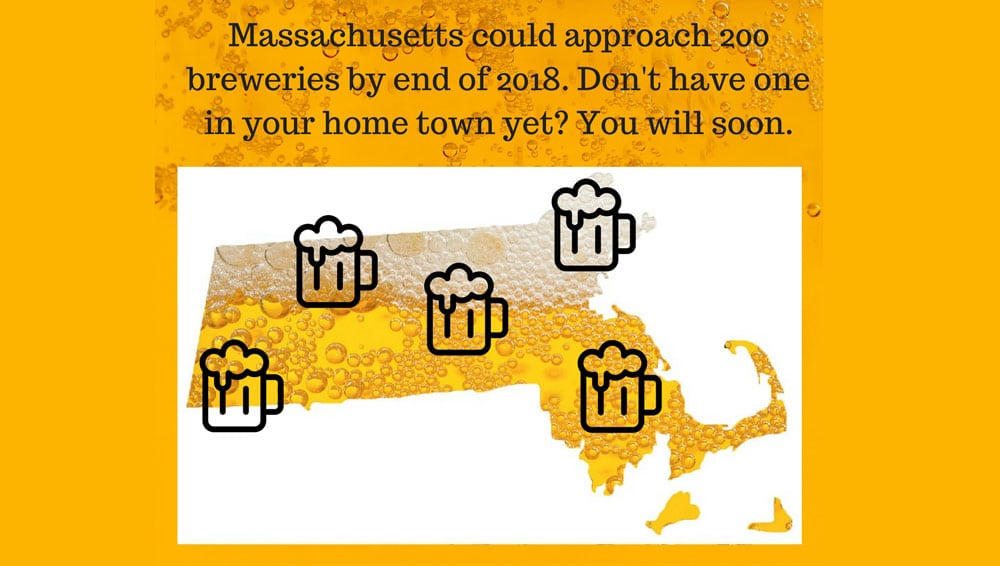Tayler Pitkin has been impressing his family and friends with his home brewed beer for some time now. Encouraged by their praises, he more recently introduced himself and his favorite recipes, including a Double IPA and a Blueberry Hefeweizen, to the local craft beer public at large. Those reviews have mostly been positive too. It’s time, he thinks, to take his self-described “larger than normal home brew operation with higher ambitions” to the next level.
He’s not alone. At least 30 others, many of them aspiring home brewers like himself, have announced plans to open commercial breweries in Massachusetts by the end of 2018, and that number is likely to increase. It’s the latest wave in a veritable tsunami of brewery openings that has flooded the local craft beer scene recently. Like the others, nearly 100 of them in the last 5 years, this year’s newcomers are riding a swell that just seems to keep going and going.

The number of breweries in Massachusetts has tripled in the last 5 years, and shows no signs of slowing down.
After careful consideration, Pitkin Point Brewery (named after a treasured family property off the coast of Maine) has opted to start as a contract brewery. Instead of opening a brick and mortar space of his own, Pitkin will rent time at an existing brewery, who’s name he’s not yet at liberty to disclose, and then self distribute his beer to bars, packies and restaurants he’s courted. Though he’d like nothing better than to have his own nano brewry and taproom in his home town of Carlisle, it seems a bit too much of a leap, at least for now.
If Pitkin Point’s strategy for entering the craft beer market seems like wading in, then Leadfoot Brewing is jumping, cannon ball fashion. As the name suggests, they plan to enter the market full speed ahead with a 30-barrel system, full-service taproom, and regional distribution plan. The former warehouse space in Chicopee was once part of the old Hampden Brewery that closed back in the 1970s. If things go according to plan, co-founders Pat Randall and Jeff Thibodeau, whose recipes up to now have been brewed on a 1/2-barrel setup in Pat’s house, hope to open their formidably sized commercial brewery in June.
Given the crowded and competitive market conditions, some might wonder if Leadfoot’s pedal-to-the-metal approach is rash. Some in the industry have warned of a pending shakeout, but others say no. The truth is no one can really predict where the future of craft beer is headed. Opinions range from ominous headlines touting the “B” word to overzealous speculation that 50 breweries might open in Massachusetts in 2018. There’s little doubt that continued growth is likely for many, but the real question is where that market share will come from. If it’s at the expense of macro beer, everybody wins. If.
Related: Full Speed Ahead For Leadfoot Brewing
For now, Leadfood Brewing, whose state license recently came through, appears to be on cruise control for a summer opening. For others, the road to commercial brewery aspirations can be fraught with potholes. Just ask Keith Carvalho, whose dream of opening a brewery in his home city of Fall River started three years ago. He thought he’d found a home for Troy City Brewing back in 2016, a garage space where his nano setup would allow him to brew small-batch beers for local distribution. But after bumping up against city hall and crunching the numbers in his business plan it was clear things weren’t going to work out.
“A well vetted business plan and pre-approved financing are crucial for any brewery-in-planning,” says Rob McGovern, an attorney and craft beer aficionado who specializes in the alcoholic beverages and hospitality industry. “In such a capital intensive business, having enough up-front money is key for anyone hoping to secure a lease.”
After that it’s zoning regulations, submitting floor plans and equipment orders for the Federal brewers notice, working with the ABCC for state license approval, and community outreach to grease the skids on acquiring a local pouring permit. “Most breweries are going to need at least some legal guidance,” McGovern advises, “if only to get through the mountain of paperwork.”
The transition from home brew outfit to commercial brewer has certainly been an uphill climb for Mike Plassmann and Jim Wilson, co-founders of SpaceLab Beer Co. on the North Shore. Makers of beer that many have described as “out of this world,” as their name would suggest, they recently suffered a setback when a property they thought would be perfect for their nano brewery and taproom fell through. The disappointment comes after a nearly yearlong search, and leaves them more uncertain than ever about their future.
There are worse things than having to go back to the drawing board. Carvalho put Troy City on the back burner (a decision he describes as a blessing in disguise) and took a job as head brewer at another startup, Shovel Town Brewery, who recently celebrated a successful first anniversary. The experience provided invaluable on-the-job training and helped him regroup. He’s since found a partner and is refocused on opening his brewery at a new location, this time with a taproom.
What SpaceLab does with its extended transition time may prove to be equally valuable. One partner has already taken a job as a cellar man at a well respected commercial brewery. It’s likely the experience, and the relationships he’ll make there, will make SpaceLab’s transition that much easier when the time comes. There’s also more time for learning to operate their newly purchased crowler machine, and for formulating more of the innovative recipes that have set them apart and helped them rise to cult status among some beer geeks.
Related: Final Frontier For SpaceLab Is Finding Space For A Brewery
Innovative, high quality beer and devoted younger followers may be the difference between thriving and just surviving as the state’s brewery count continues to steadily rise. Just ask Trillium, who started in a tiny pilot brewery in Boston’s Fort Point neighborhood and now has a fast-growing regional brewery in Canton. Or Tree House, who moved its operation to a larger, state-of-the-art facility this summer and still has lines out the door. They, along with a dozen or so others, have quickly gained market share while Sam Adams, Harpoon and a number of the established regional players have recently leveled off or even lost ground.

Social media, designer glassware, and creative can design helps Vitamin Sea Brewing create buzz for its beers.
In an industry that’s experiencing such dynamic growth, and where consumers are often drawn to the “everything new,” branding is more important than ever. High profile homebrew outfit Vitamin Sea Brewing is a prime example. They haven’t sold a drop of beer yet (by law they can only give it away), and still operate out of co-founder Dino Funari’s basement in Hull, yet they regularly create the kind of social media buzz that any commercial brewery would envy. Not surprisingly, they can barely keep up with demand for their beer, especially given the production limits placed on home brewers by the federal government.
That consumers are so eager to purchase beer which isn’t even for sale yet is a page that all aspiring breweries should have in their playbooks. It helps that Vitamin Sea is making great liquid, and that they’ve collaborated on beers with two commercial breweries already, but their marketing efforts shouldn’t be underestimated. “We want every beer to have a story,” says Funari, who takes great care when naming, commissioning artwork for, and snapping pictures of his creations.
Related: Vitamin Sea Brewing Has Commercial Aspirations
Such efforts are likely to pay off for the breweries who afford time to them, especially if they want consumers, whose craft beer dollars only stretch so far, to take and maintain an interest in them. It’s also a factor if a brand hopes to enter the competitive distribution market, where a limited number of tap lines and crowded beer store shelves pose even more challenges. According to one study, a third of consumer decision-making is based on packaging. In other words, attractive tap handles or snazzy designs on 16-ounce cans helps sell beer.

Minimizing liability and being properly insured by a reputable local company like Elliot Whittier can be crucial for a startup brewery. Learn more.
Of course a brewery can always forego distribution all together, if in addition to manufacturing its own beer it wants to be in the retail business. One of the fastest-growing trends is that of the brewery taproom. The number of Bay State craft beer makers pouring pints and serving flights on premises grew by an astonishing 33 percent in 2017. And scores more are on the way thanks to fatter profit margins and the fact that nearly half the state’s 50 largest cities and towns don’t yet have one. Braintree’s first, Widowmaker Brewing, opened only four months ago and already co-founder and head brewer Ryan Lavery is selling enough beer to contemplate a switch from his current career to a full time commitment at the brewery.
Just how long the “if you build it, they will come” trend lasts in such a dynamic industry is the million dollar question, but the answers may vary. Three factors that seem essential are brewing standout beer, having a taproom in a great location, and developing a rock-solid business plan. Which, and how many of those challenges a startup brewery can feasibly conquer will go a long way in determining whether they should go big, go hyper-local, or go home, as in stick with home brewing.

What’s in a name? Research & trademarking. Just ask the homebrewers formerly known as Whistle Blower Brewing, whose decision to pursue commercial ambitions required an unanticipated name change.
Fortunately, would-be commercial brewers don’t have to go it alone when trying to work through the big questions. One need look only as far as the nearest local brewery to get help. This may sound corny, but the craft beer industry as a whole, especially the community here in the Massachusetts, is pretty amazing that way. The Mass Brewers Guild is another valuable resource, especially their Meet The Freshman Brewers event in March, and the New Brewery Bootcamp seminar they hold in June.
Another way to sidestep some of the potential pitfalls of starting a new business is to spend some time in the trenches. “Whenever I hear about a home brewer trying to start a brewery without any professional experience, I ask why would you do that,” says Isaac Boucher, a home brewer himself, and one of the brewers at Night Shift.
It’s a point not lost on Mike Snowdale, a home brewer who plans to open Stellwagen Beer Co. in Marshfield later this year. He combed the classifieds on ProBrewer for months, eventually finding Brian Flach, a pro who will leave his post at John Harvard’s this spring to become head brewer and partner at Stellwagen. “I’m a decent brewer, but I needed someone who could come in and make high quality beer on day one,” says Snowdale. “That way I can focus on getting the company off the ground.”
Even with the best laid plans, getting off the ground can be a challenge. For most new breweries, the path to opening usually takes longer than expected, and is often more expensive then anticipated. Rob Burns, one of the co-founders of Night Shift, thinks starting as big as you can is worth the extra time and money. He wishes they’d started on a 10-barrel system, and says they outgrew their first brewery and taproom, which he described as having “a grungy bathroom with no heat, and looking like something from the set of a ‘Saw’ movie,” way faster than they thought they would. Other new breweries that started with smaller systems have sometimes run out of beer in the early stages.
Admittedly, outgrowing your brewery space or running out of beer are good problems to have. But as the wave of new brewery openings continues across the Commonwealth, its rising tide may bring with it new challenges. Much of the easy money has already been made, and as we rapidly approach 200 commercial beer makers in Massachusetts, the chances of becoming the next Night Shift are getting slimmer. Explosive industry growth over the last five years has given them, and others, a formidable head start. Those just paddling toward the craft beer wave now may think “the future’s so bright they gotta where shades,” but they’d be wise to bring a flotation device along with them.




Excellent content of premium quality